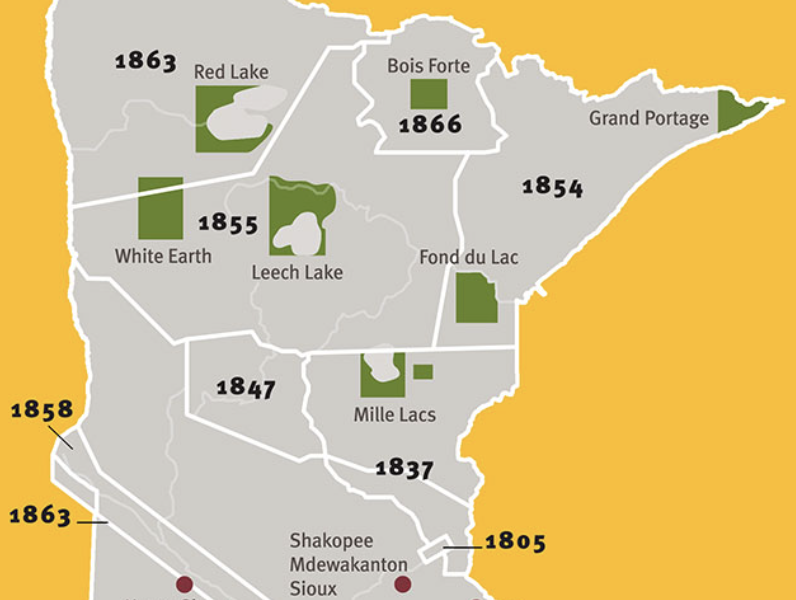At the University of Minnesota, a $5 million grant is funding projects to address racial justice, with the aim of leading social and cultural transformations. One project examines the University’s history with the state’s Tribal Nations. Here’s reporter Feven Gerezgiher with more.
In the wake of a racial reckoning and thirty years after the Minnesota Indian Affairs Council first asked the University of Minnesota to repatriate American Indian human remains, the Council in 2020 passed a series of resolutions demanding “a truthful historic accounting” of the university’s impact.
Two high level people are working to make this happen from within the University. Last year, UMN President Joan Gabel hired Fond du Lac member Karen Diver to her senior leadership team. Professor Tadd Johnson, member of the Bois Forte Band of Chippewa, serves as liaison between the UMN system and Tribal Nations as Senior Director of the Office of American Indian Tribal Nations Relations.
Johnson says the U has to contend with its grim founding story.
“The University of Minnesota benefited from the genocide of Native American people, and kicking them out and actually killing them, hanging them,” Johnson said. “…so to me, Minnesota has a special obligation because I mean, there’s some shame in having the largest mass execution in American history and then the U of M ended up benefiting from it.”
The project is called the Towards Recognition and University-Tribal Healing or TRUTH Project. It is led by research fellows from and selected by each Tribal Nation. Johnson said their histories are not monolithic, “The[1] Ojibwe up north are saying, ‘Hey, you took the DNA of our wild rice and put our wild rice businesses out of business.’ And the Dakota are saying, ‘Hey, you took all of our land and sold it, and kicked us out of Minnesota and made a ton of money to endow your university.’”
The TRUTH Project is funded through a larger system-wide initiative called Minnesota Transform that was established through a $5 million grant from the Andrew W. Mellon Foundation. Minnesota Transform seeks to make changes for the region’s Black, Indigenous, immigrant, and refugee communities. In addition to the TRUTH Project, it supports access to UMN Dakota language classes for community members[2] and creates Ojibwe language immersion housing for students.
An Garagiola is a research assistant with the TRUTH Project and descendant of the Bois Forte Band of Chippewa. She said part of the research has been delving into the impact of the 1862 Morrill Act and other land grabs.
“So often the narrative that we hear about land grant universities or the founding of land grant universities is this positive spin, as this was for the betterment of the country or for the public good, if you will,” said Garagiola. “But we don’t really talk about who the public is or whose expense that came at.”
According to data from High Country News, the U.S. government bought Dakota land in one treaty at $0.02 per acre. In contrast, the University of Minnesota sold those lands for $5 per acre, or 251 times that amount[3] .
Garagiola points to the U’s far reach in the state – from education to the business sector – as reason why it should lead this work. She says many professionals are unaware about sovereign rights or consultation policies for Tribal communities[4] .
“I think that the university has a great responsibility to teach everybody, Native and non-native, the accurate truth, and to prepare them to go out into their future careers accurately informed,” she said. “And more broadly, the University has a responsibility to Indigenous people because of the anti-Indigenous policies that were created in order to found the institution.”
The TRUTH Project’s report is expected to be released in June. Tribal research fellows plan to hold a symposium in April to share their research with community and get final feedback before its release.
In the meantime, the UMN Board of Regents recently voted to return artifacts belonging to the Mimbres people.
For Minnesota Native News, I’m Feven Gerezgiher.
Subscribe to Minnesota Native News in your favorite podcast app
- Indigenous Author Publishes Book of Anishinaabe Poem-SongsMarcie R. Rendon released her first book of poetry, “Anishinaabe Songs for a New Millenium.” The book launched at Birchbark Bizhiw in Minneapolis last Tuesday, July 16th. Two Anishinaabe musicians …
- Headlines 7/18/24This week, two examples in Minnesota that support the larger “Land Back” movement across Indian Country, Mille Lacs Band of Ojibwe’s new Chief Executive, urban Native-led organizations celebrate during a …


 Allison Waukau’s Gift for Raising Native Representation in Libraries
Allison Waukau’s Gift for Raising Native Representation in Libraries